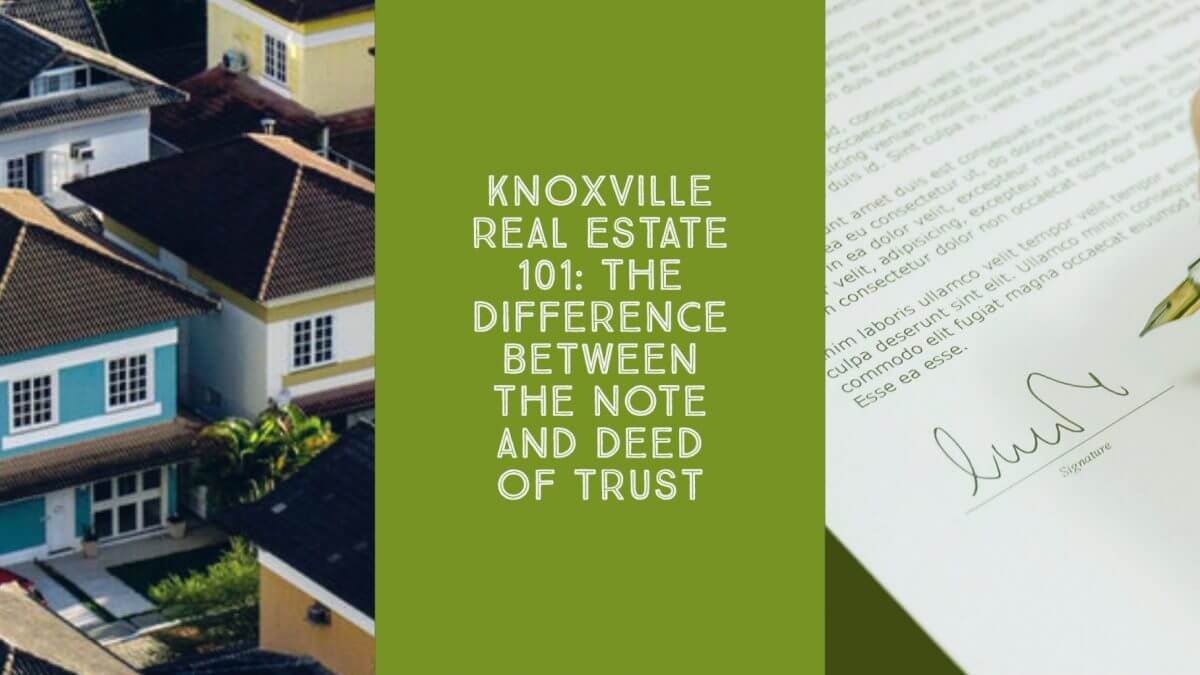
When you buy a Knoxville home, you will sign a lot of documents at closing. Some of these documents will be more important than others.
But, two of the most important you will sign at closing are the note and the deed of trust. These documents are often confused with one another. So, it’s important that you understand the difference between these two documents and some of the important parts of these.
In this Knoxville Real Estate 101, we look at the difference between the Tennessee note and the deed of trust.
What Is The Deed Of Trust?
In Tennessee, a deed of trust is what’s recorded in the register’s office to secure the loan. For both the borrower’s protection and the lender’s, a deed of trust is of public record. It outlines each of the parties responsibilities for the loan.
It includes the following information:
- The loan amount
- Legal description of the property
- The parties involved in the transaction
- Provisions and requirements of the deed of trust
- Legal procedures
- Acceleration and alienation clauses
- Any riders attached to the deed of trust
The deed of trust is one of the most important documents you will sign at closing. It’s recorded immediately after closing and returned to your lender.
Important Features Of The Deed Of Trust
Tennessee is a state that uses a deed of trust, instead of a mortgage. Deeds of trust have some interesting features that are a bit different than a mortgage.
Use Of A Trustee
Unlike a mortgage, deeds of trust are unique in the fact that they use a deed of trust. Every mortgage has a trustor (the borrower), trustee (the third party who holds bare title), and the beneficiary (the lender).
The trustee is an independent third party that doesn’t represent the borrower or the lender. Once the deed of trust is paid in full, the trustee re-conveys the property. If a borrower defaults, it is the trustee who holds the power of sale clause.
Due On Sale Clause
Every deed of trust contains a due on sale clause. When a property is sold or transfers title, this language allows the mortgage company to call the loan immediately due or payable. This feature is also called an alienation clause.
Pre-Payment Penalties
Pre-payment penalties are truly a thing of the past. But, if your loan does have a pre-payment penalty, that information will be outlined in your deed of trust as well as a few other places on your closing documents.
What Is The Note?
The promissory note is your promise to make payments. The note is secured by the deed of trust, which is of public record. Unlike the deed of trust, the note is not of record in the register’s office.
Here are a few of the features that are included in the note:
- Contains the terms of the loan (interest rate, due dates, etc.)
- Outlines payment obligations
- First payment date and last payment date
- How late payments are handled
Unlike the deed of trust, the note is a short document, normally 2 to 4 pages.
Important Features Of The Note
Just as the deed of trust contains important features, so does the note. Here are a few of the noteworthy features that are included in the Tennessee note.
Late Fees
Your note will let you know the due date of your payments and it will also let you know the penalty date for payments. Typically, most payments are due on the first of the month, with the penalty date being 15 days late. Just be sure to double check the note that you sign at closing.
Return Of Note To Borrower
After your note is signed at closing, the original note will be returned to the lender after closing. Once your loan is paid in full, your original note will be returned to you for your records.
Are you thinking about buying or selling a Knoxville home this year? Please let us know if there is any way that Knoxville Home Team can assist you. Rick can be reached at 865-696-9002 or via email at [email protected]. Kati can be reached by phone at 865-696-1888 or via email at [email protected].



